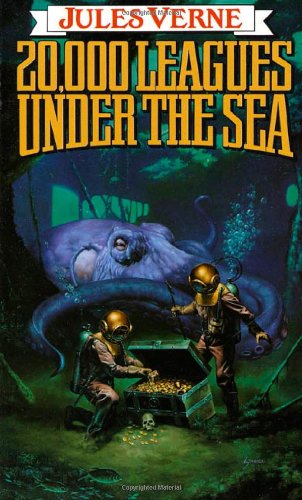
Tor Classics are affordably-priced editions designed to attract the young reader. Original dynamic cover art enthusiastically represents the excitement of each story. Appropriate "reader friendly" type sizes have been chosen for each title--offering clear, accurate, and readable text. All editions are complete and unabridged, and feature Introductions and Afterwords.
This edition of "20,000 Leagues Under the Sea" includes a Foreword and Afterword by T. A. Barron.
Jules Verne is considered the "Father of Science Fiction" because of the power of this--his most famous novel.
""The year 1866 was signalised by a remarkable incident, a mysterious and puzzling phenomenon, which doubtless no one has yet forgotten. Not to mention rumours which agitated the maritime population and excited the public mind, even in the interior of continents, seafaring men were particularly excited. Merchants, common sailors, captains of vessels, skippers, both of Europe and America, naval officers of all countries, and the Goverments of several States on two continents, were deeply interested in the matter."
"For some time past vessels had been met by 'an enormous thing, ' a long object, spindle-shaped, occationally phosphorescent, and infinitely larger and more rapid in its movements than a whale.""
It is this "something" that Professor Aronnaz sets out to encounter--and thus begins the most incredible underwater journey ever. From Atlantis to the South Pole, the reader is taken through dangers, surprises, and the unsurpassed majesty of the marine world.
Two stars is almost generous; given his importance in the history of the science fiction genre, it really seems like Jules Verne should have produced something that stood the test of time. Twenty Thousand Leagues is a chore to read; I read in another review that a total of 75 pages are devoted to lists of fish. This explains why it didn't take me very long to read this book, after the first few fish passages, I began jumping over them whenever I noticed they were starting again.
Captain Nemo is an interesting character, but Verne practically wastes every chance to develop him into something great. I understand that in "hard" sci-fi, characters take a backseat to the science, but it's such a shame that Nemo wasn't fleshed out more. His presence alone (and deference to its position in literary history) is what saves this book from receiving only one star.
The main character's servant is almost as annoying as the fish passages; he splits his time between sucking up to his boss and compulsively classifying marine life. I wanted to strangle him every time he opened his mouth.
After suffering through this and [book: Journey to the Center of the Earth], I considered myself well educated on Verne's contributions to the genre and returned [book: Around the World in Eighty Days] to the library without reading it.
Reading updates
-
Started reading
-
2 April, 2008:
Finished reading
-
2 April, 2008:
Reviewed
